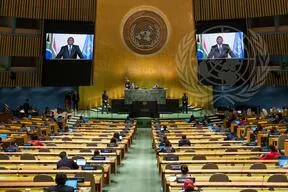Statement
Statement summary
MATAMELA CYRIL RAMAPHOSA, President of South Africa, said COVID-19 has changed forever the nature of multilateral engagement, diplomacy, business and basic human interaction. While it was indeed through solidarity and cooperation that countries were able to access medical equipment and supplies, the global community has not sustained these principles in securing equitable access to vaccines. With more than 82 per cent of doses acquired by wealthy countries, and less than 1 per cent sent to low-income ones, he urgently supported the proposal for a temporary waiver of some provisions of the Agreement on Trade-Related Aspects of Intellectual Property Rights, which would allow low-income nations to produce vaccines.
“We need to prepare now for future pandemics and work with greater determination towards the goal of universal health coverage,” he stressed. In addition, he called for providing them with the means of implementation to achieve the Sustainable Development Goals, describing the $650 billion allocation of special drawing rights as insufficient and thus calling for 25 per cent of the total allocation — $162 billion — to be made available to Africa. On climate, he said the twenty-sixth Conference of the Parties to the United Nations Framework Convention on Climate Change (COP26) must launch a formal work programme on the implementation of the Global Goal on Adaptation.
He went on to call for an enhanced relationship between the United Nations and the African Union in maintaining peace, financing peacebuilding and advancing post-conflict reconstruction. He drew attention to the right of Palestinians to self-determination, urging all nations to help find a just, lasting and peaceful solution based on internationally agreed parameters enshrined in relevant resolutions. The people of Western Sahara have the same right, in line with relevant African Union decisions, he said, calling also for a lifting of the embargo on Cuba.
Noting that it has been 12 years since the start of intergovernmental negotiations on reform of the Security Council, he said: “We have not honoured this undertaking.” He reiterated the call for urgent reform and a move to text‑based talks. “We must address the underrepresentation of the African continent in the United Nations system,” he insisted. He said the Durban Declaration and Programme of Action remain the international blueprint for fighting racism, stressing that “racism, like sexism, xenophobia and homophobia, demeans us all”. Above all, nations must close the wounds of poverty, inequality and underdevelopment that prevent societies from realizing their potential. This can only be done within the framework of a revitalized and reformed multilateral system, with a strong United Nations at its centre.
Full statement
Read the full statement, in PDF format.
Photo

Previous sessions
Access the statements from previous sessions.
